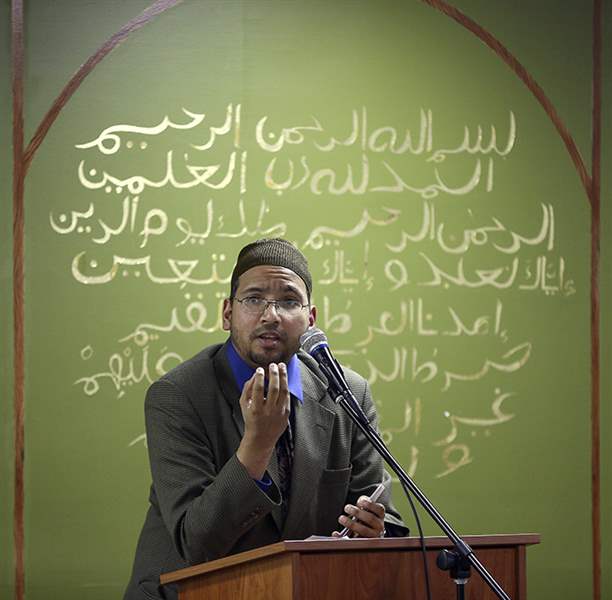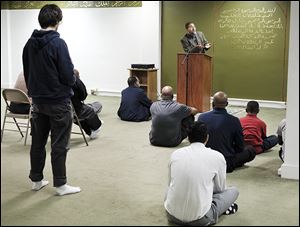
THE ISLAMIC STATE
Clerics challenge ISIS’ view of Islam
Local imams denounce terrorism
11/22/2015
During a prayer service at the Masjid Al Islam mosque on Friday, Imam Shamsuddin Waheed said the Paris attackers were not truly Islamic because they did not follow rules of the faith.
THE BLADE/JEREMY WADSWORTH
Buy This Image

During a prayer service at the Masjid Al Islam mosque on Friday, Imam Shamsuddin Waheed said the Paris attackers were not truly Islamic because they did not follow rules of the faith.
Every time terrorists push the detonator on a suicide belt in a cafe or shoot down defenseless people at a concert while using the words “Allahu Akbar,” they may think they are doing God’s work as prescribed by Islam.
Not so, says an increasingly vocal chorus of Islamic leaders and scholars. Not even close.
Despite verses in the Qur’an that critics interpret as incitements to terrorism, the Nov. 13 attacks in Paris once again forced Muslim leaders of the world to disavow terrorism perpetrated in the name of Allah, as God is known to Islam.
Imam Shamsuddin Waheed, leader of Toledo’s Masjid Al Islam mosque on East Bancroft Street in Toledo, said no respected Islamic cleric or scholar believes acts of terrorism are justified by the Qur’an.
“The religion is very clear. It mentions ‘don’t take life.’ It has prohibitions of suicide, murder — even in wartime, killing innocent civilians, prohibiting destroying other places of worship,” Mr. Waheed said.
“The people who have promoted these ideas of suicide bombings have actually not been — quote, unquote — clerics,” Imam Waheed said.
“ISIS has been universally condemned as contrary to Islamic teaching. I guess this Friday I’ll be compelled to address this topic,” Mr. Waheed said last week.
He did just that.
In his Friday afternoon sermon, Imam Waheed said the Paris attackers could not have been truly Islamic, as shown by reports that they didn’t fast and didn’t pray, and that one sold drugs.
“Are these people going to bring forth a caliphate? It doesn’t make any sense,” Mr. Waheed said. “We live in a time when Islam is represented by those who don’t even follow its basic precepts.”
Following this sermon in Mr. Waheed’s mosque were about three dozen people, mostly sitting on the carpet in the large open room with few chairs, a table, a lectern, and a microphone. Only two women were there, sitting separate against the back wall. When they entered, worshipers stood and then prostrated themselves toward Mecca, the holy city of Islam, silently praying. Printed on the walls are Arabic letters spelling out the 99 names of God.
After his 20-minute talk, Imam Waheed led formal prayers in Arabic. The mosque’s emir, sort of like a deacon, called the congregation to worship with the words, “Allahu Akbar.”
One of the younger worshippers was Rami Kareem, 21, a student at Owens Community College who is studying business to succeed his businessman father, Basem Kareem.
“One of the biggest parts of the religion is you never harm an innocent person for any reason,” Rami Kareem said. “They outright deny the writing [in the Qur’an].”
With ISIS — the Islamic State in Iraq and Syria — he speculated a young involved person must have a damaged upbringing to fall into what he called “corrupted religion.”
Across town, Imam Ahmed Mohamed Abou Seif, lecturer at the Toledo Muslim Community Center on Sylvania Avenue in West Toledo, said a terrorist who claims to be a martyr for Islam is like someone who uses a stolen credit card.
“They stole my Islam. It’s not representative of Islam in any way. I am, with everybody in the whole world, as a victim of those people,” Imam Abou Seif said.
He said he was approached last week by the FBI, not with suspicion but to promise the protection of law enforcement in case of any violence or harassment.

Imam Shamsuddin Waheed conducts his regular prayer service after addressing ISIS’ actions in a talk on Friday.
Making their point
One Muslim response to ISIS is an open letter signed by hundreds of Muslim scholars and leaders around the world condemning ISIS’ actions and posted on the Internet. Titled “Open Letter to al-Baghdadi,” the ISIS leader, its 25 pages state in explicit terms how contrary to Islamic law ISIS’s practices are.
Its “executive summary” lists 24 numbered admonitions telling what is forbidden or allowed under Islam. Clearly forbidden are killing innocents, denying women their rights, killing journalists and aid workers, torturing people, and forcing conversions.
It forbids issuing “fatwas” — religious orders — or attempting to interpret the Qur’an without having the necessary religious training. And it rejects ISIS’ claim to be a “caliphate” for the simple reason that it lacks Muslim consensus to be one.
“You have provided ample ammunition for all those who want to call Islam barbaric with your broadcasting of barbaric acts, which you pretend are for the sake of Islam,” the letter states. “You have given the world a stick with which to beat Islam whereas in reality Islam is completely innocent of these acts and prohibits them.”
A critic of this letter as an insufficient response from the Muslim community is American Muslim M. Zuhdi Jasser of Phoenix, a prominent author, TV commentator, son of Syrian refugees, and a Navy veteran. He said the letter scolds al-Baghdadi but seems to sympathize with al-Baghdadi’s goal of a caliphate.
“Clearly, the majority of the mosques in the United States are led by imams who are Islamists — who believe that in Muslim-majority countries that the state should be identified as an Islamic state,” Mr. Jasser said.
“Most of the imams are sympathetic to the ideology of the Islamic State. I found that letter offensive in its denial of deeply needed reforms. It’s incompatible with American law,” said Mr. Jasser, the president of American Islamic Forum for Democracy.
‘Heretics’
Ovamir Anjum, the Imam Khattab Chair of Islamic Studies at the University of Toledo, said ISIS’ claim of being a caliphate is “a joke.”
“If you’re actually learned in the Islamic tradition you would know that these people are heretics,” Mr. Anjum said. “It’s like saying the KKK is Christian.”
He said “all Islam” condemns terrorism but that the terrorists find self-proclaimed and poorly educated imams who share their frustration and hatred.
“These are mom-and-pop sort of clerics who are saying, ‘You want revenge I’m going to tell you can do this in the name of God,’” Mr. Anjum said.
To Muslims, Mohammed was the last prophet in a line of prophets picked by God starting in the Old Testament and including Jesus, whose mission was to get humans to follow God’s laws.
Unlike Jesus, who is portrayed in the Gospels as owning nothing, unmarried, and passively accepting crucifixion by his enemies, Mohammed was a merchant, a husband and father, political leader, and a warrior when necessary, as well as deeply religious. His calling as a prophet came at the age of 40 when he said he was visited by an angel who dictated the words that became the Qur’an, launching the religion that started 1,400 years ago and today counts some 1.6 billion adherents.
Those writings address the concerns of a religion besieged by enemies. Islamic scholars say that any verses in the Qur’an that appear to advocate violence relate strictly to the conduct of defensive war.
Among the most famous is a verse that says, “Slay the unbelievers wherever you find them.” Another says, “Wherever you see the unbelievers, strike them in the neck.”
Radical voices
Islamic clerics, self-proclaimed or not, who publicly endorse ISIS’ actions, or even al-Qaeda’s form of jihad — are hard to find.
A Muslim cleric who supported terrorism was Anwar al-Awlaki. He served Muslim congregations in the United States including as the Islamic chaplain to George Washington University before his radicalism was exposed and he relocated to Yemen.
Al-Awlaki was known to have encouraged Army Maj. Nidal Malik Hasan, whose shooting rampage in 2009 killed 13 people at Fort Hood, Texas. Al-Awlaki was killed by a U.S. drone strike in 2011 in Yemen.
“As a rule you will find that people who do advocate those things are people who have had no religious training, such as Sayyid Qutb,” Mr. Waheed said, citing a prominent Egyptian Islamic writer from the 1950s and ’60s whose work inspired the Muslim Brotherhood and al-Qaeda. Qutb was executed in 1966 for participating in an assassination plot in Egypt.
According to Mr. Waheed, Qutb was a writer and a schoolteacher, not a cleric.
“Sometimes people take their own baggage into their reading of texts,” he said, adding that Islam is not the only religion with that problem.
Mr. Waheed said there has never been a person in his mosque who has talked to him about engaging in violent jihad — “Not one time.”
Contact Tom Troy: tomtroy@theblade.com or 419-724-6058 or on Twitter @TomFTroy.